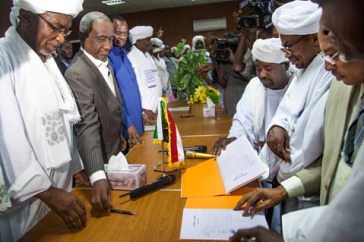
Representatives of Sudan (left) and leaders of Abbala and Beni Hussein ethnic groups (right) sign the document of agreement in the North Darfur Wali (Governor) residence in El Fasher, North Darfur., a photo by Pan-African News Wire File Photos on Flickr.
SUNDAY 28 JULY 2013
Bashir working on a major initiative for Sudan’s problems: VP
July 27, 2013, (KHARTOUM) - The Sudanese First Vice President Ali Osman Muhammad Taha announced today that president Omer Hassan al-Bashir has embarked on formulating a comprehensive and effective vision which aims at arriving to radical solutions for Sudan’s political problems particularly the conflict in Darfur.
He offered no further details on what the proposal might entail. This week, Bashir has given an unusually candid assessment of the situation in his country, expressing regret over the prevalence of bloodshed in Sudan and even appeared to be holding himself personally responsible.
The veteran Sudanese general, who has ruled Sudan for 24 years since staging a coup in 1989, also said that the “injustice” shrouding the country resulted in drought and lack of rain.
“How can we ask for mercy [from god] when our hands are covered in blood?”, Bashir said.
Taha, who witnessed along with the Head of Darfur regional Authority (DRA) al-Tijani el-Sissi the signing ceremony of the peace pact between Rezeigat Aballa and Bani Hussein tribes in North Darfur capital of Al-Fasher yesterday, congratulated the signatories and announced the presidency’s endorsement of the peace deal.
Inter-tribal clashes erupted last January between members of the rival Arab tribes who were fighting for control of the region’s gold mines.
The United Nations estimates that some 150,000 people have been displaced following a spate of attacks by armed Aballa militias, elements of which include the notorious Janjaweed forces, which hit the headlines 10 years ago for brutal atrocities allegedly committed at the behest of the Sudanese government.
The agreement, which included 21 provisions, focused on identifying losses and determining compensations as well as the mutual commitment to an immediate cessation of hostilities. It also stated that government authorities will assume administrative responsibility over Jebel Amer.
It further provided for returning stolen land, opening roads, securing markets and farms and controlling movement of vehicles.
The deal called for setting up a compensation fund from the gold revenues of Jebel Amer. 65% of the money shall be allocated for Diyas (blood money), 25% for rehabilitating localities which were adversely impacted by the conflict including Al-Seraif locality, and 10% for insurance and administrative expenses.
Taha underscored the government’s commitment to the spirit and provisions of the pact as well as asserting the authority of the state and rule of law. He called upon cultural, social, women, and political institutions to work towards ending war and engaging in developing programs which promote peace and stability.
The 1st further sent a message to all Darfuris, particularly youths asking them to preserve their efforts to fight the enemies of Sudan instead of fighting each other.
He expressed hope that this peace deal would contribute to lifting Darfur from its misery, ending conflicts and restoring the social fabric.
The head of the DRA, Tijani el-Sissi, for his part, called for enforcing state authority in all Darfur states by strengthening the army, police and security forces.
El-Sissi said that the absence of the state has led to the emergence and escalation of violence and conflicts in the region. He stressed the DRA support for the peace deal to preserve blood of the Darfuris, calling for applying deterrent rules against those who violate the truce this time around.
The Darfur official called upon all Darfuris to rethink the consequences of conflicts which claimed lives of women and children and destroyed properties and farms, saying “I hope that history wouldn’t record that we [Darfuris] have destroyed our region”.
He went on to ask Darfuris to exercise self-criticism and to answer the question: Why are they fighting? pointing that every war has local and international lords.
Al-Sissi sent a message to the intellectuals of Darfur asking them to support their people and not to use their tragedy and blood for achieving personal interests, pointing that the DRA will hold six conferences regarding lands, pastures, dispute identification mechanisms and intellectuals.
Tribal clashes have recently mounted in Sudan’s Darfur region.
Over 40 people were killed and about 45 others injured in clashes between Al-Salamat and Misseriya tribes in Central Darfur state last June.
Despite numerous truces signed by the tribes fighting kept being re-ignited adding to the instability of the already restive region.
(ST)
No comments:
Post a Comment